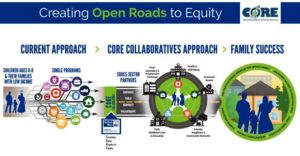It used to be that United Way of Snohomish County conducted workplace fund-raising campaigns. You could have a little taken out of your paycheck each month and that money may have gone to support seniors, kids, YMCA and dozens of other individual programs that helped people in Everett and Snohomish County. This week United Way of Snohomish County introduced a new way of doing business. It may be best explained in this short video…
Here is a list of frequently asked questions with answers provided by United Way about the new approach.
What is United Way’s new direction?
United Way of Snohomish County is moving beyond its traditional role of simply being a fundraiser to being a funder, partner, convener, and catalyst for positive, lasting community change. We are embarking on new methods to solve some of Snohomish County’s toughest social problems, adopting two promising national models: Collective Impact and the 2-Generational Approach.
Why are you changing your approach and role in the community?
Many United Ways around the country have moved or are moving toward a Collective Impact model because it creates a more focused, measured way to collaborate and produce long-term outcomes. United Way of Snohomish County is growing in response to the demands of a changing community. Our work is at the beginning of an exciting new chapter and will be focused on cross-sector collaboratives (groups of community partners working together) creating long-term solutions for families with young children. We believe that simultaneously meeting the needs of both the child and the adult has the greatest potential to advance family success.

United Way of Snohomish County is changing how it provides services to Everett and Snohomish County.
What is CORE?
Creating Open Roads to Equity (CORE) is about placing the whole family at the center of a collaborative partnership where multiple nonprofit, public, and private partners are working together to meet not only the needs of the child, but those of the entire family.
What is the 2-Generational Approach?
The 2-Generational approach provides opportunities for, and meets the needs of children and their families together. This approach focuses on outcomes around early childhood education, post-secondary and employment pathways, economic assets, health and well-being, and social capital for both the child and the adults in each family.
What is Collective Impact?
Utilizing five conditions: common agenda, shared measurement plan, progress measures, mutually reinforcing activities, continuous communication, and backbone support, Collective Impact fundamentally changes the way nonprofits, public, and private partners work together to address the root causes of complex social issues with which families with low income struggle.
What are some examples of Collective Impact and 2-Generational work?
In the United Way system, Salt Lake City and Cincinnati are two examples of those farthest along in their Collective Impact work. There is momentum toward Collective Impact building across the nation. Hundreds of initiatives are using this approach, including several federal programs such as the 2014 Social Innovation Fund and
programs of the Center for Disease Control and Prevention (Source: The Collective Impact Forum, 2015). You can read more about Collective Impact at www.collectiveimpactforum.org. National conversation is also building around the successful outcomes of surrounding both a child and their family with solutions-based work, or the 2-Generational Approach. Ascend at The Aspen Institute is the leading voice on this approach. Learn more at www.ascend.aspeninstitute.org.
What is a Collaborative?
A collaborative partnership or “Collaborative” is a formalized group of cross-sector partners utilizing a 2-Gererational approach and the conditions of Collective Impact: shared understanding of the work (common agenda), common progress measures (shared measurement plan), coordinated plan of strategies/activities (mutually reinforcing activities), communication plan between partners (continuous communication), and supporting infrastructure of staff or a central organization (backbone support) with a focus on long-term outcomes for young children and their families with low income.
What are you doing to prepare the community and partners for this change?
Over the last few months, United Way has been in constant communication with our community partners. We have shared our new direction and have been working closely with cross-sector partners across Snohomish County to help facilitate the development of intentional Collaboratives. In April, we awarded Collaborative Planning Grants to 26 groups of cross-sector partners who are having conversations about collaborative approaches for families with young children. We have been providing ongoing technical assistance along the way to help partners prepare for the release of our multi-year Collaborative Grants and 1-year Basic Needs Grants on June 6. Here is a list of the funded planning projects and their potential partners:
https://www.uwsc.org/sites/uwsc.org/files/listofundedplanningprojects5-18-17.pdf
Why focus on children birth to age 8?
The learning, development, and stability of a child’s early years is crucial to their success in life. Proving success through this model around families will find solutions that are scalable and replicable to affect long-term systems change to achieve access to opportunity for everyone in our community.
How will CORE help families with young children?
United Way’s new direction is about addressing complex root causes that are as unique as each family. It’s about moving families with young children toward successful long-term outcomes, and effectively changing the lives of their children and generations to come.
The Basic Needs Program Grants will be awarded to programs that provide basic need services and/or access to services for young children (birth to age 8) and their families with low income. The first stage of the application process is the submission of a letter of intent, due by 5pm on July 25, 2017. Letters of Intent must be submitted via the United Way’s online portal. Potential applicants can review the funding guidelines, FAQs, instructions, and info session dates on our website




June 13, 2017
Everett